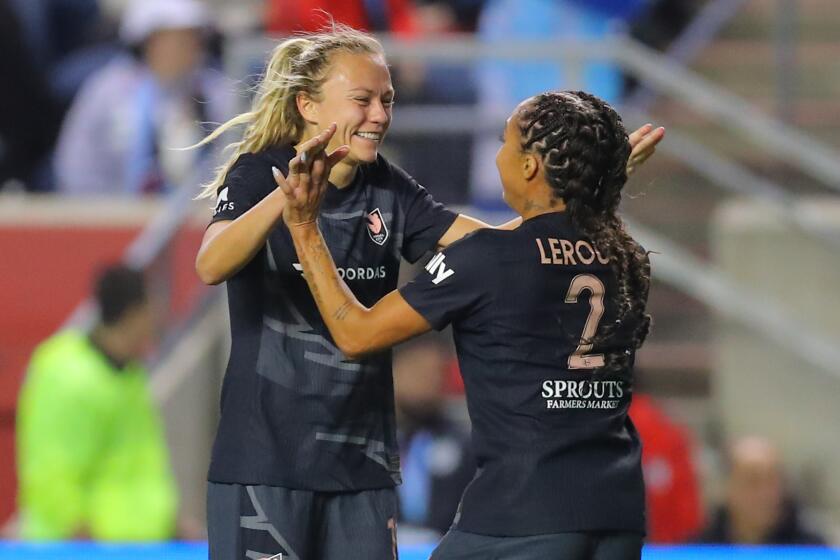Putting together a sports team of winners? Men need not apply
If I was asked to assemble a team of American athletes to compete against similarly composed teams from the rest of the world in any sport, the most important decision would be the easiest.
I would take a team of women.
I would take a team that would play like a team, unselfish and unaffected, tough and tireless, playing for victory not credit, playing for each other instead of themselves.
I would take a group like the U.S. women’s soccer team, and not because it is playing Japan on Sunday for the World Cup championship, but because of how it played in reaching this stage, stoic through their storms, sharing through their failure, winning not with shots off fancy feet, but passes off rock-hard heads.
I would take groups like the women’s teams that have won three of the four Olympic soccer gold medals, six of the nine basketball gold medals, and three of the four softball gold medals in such overpowering fashion that the International Olympic Committee eliminated the sport.
I would take our women not only because Title IX has empowered them into a huge advantage over the rest of the world, but also because they consistently win in ways that our men sometimes neglect or ignore.
Go ahead, pull my man card. This is as plain as the grit in Abby Wambach’s stare, and anyone who watches both men’s and women’s sports knows it.
With their status often based on nightly highlights and rich endorsements, the men’s team athletes in this country are increasingly about themselves. How many times do you see a team achievement overshadowed by an individual celebration? How many times is their biggest competition not on the playing field, but their locker room, everyone wanting their touches, their moments, their fame?
Perhaps because they receive little of the attention and none of the riches, most of our women athletes are all about one another. Our most hyped women’s soccer star, Mia Hamm, never acted like a star. Our most glamorous women’s basketball player, Lisa Leslie, was forever leaning down to give credit somewhere else.
Men often complain about misfortune, women often figure out a way around it. Men sometimes take shortcuts, women make the extra pass.
Last season, an NFL coach was suspended for tripping a player on the field. A couple of years ago, a group of Central Washington University softball players were lauded for carrying an injured Western Oregon player around the bases to complete her home run trot after she injured a knee.
There is a reason John Wooden once told me his favorite sport was women’s basketball.
“I liken the situation of our women athletes to that of this country’s new immigrant populations,” said Donna Lopiano, former longtime chief executive of the Women’s Sports Foundation and one of this country’s most influential women’s sports figures. “Those immigrant populations were given an opportunity they had never been given before, so they embraced it, and just outworked the opposition until they prevailed.”
Lopiano, who has coached men’s and women’s volleyball teams, said a basic belief difference between the genders is also a factor.
“Women have a higher level of sensitivity and recognition that they might not be able to overcome errors with strength, speed or reaction,” she said. “Men always think, oh, I’ll get there.”
In other words, women athletes believe they need one another, and men sometimes don’t.
I could have told you that much from sitting on a ragged lawn chair for hours as my two daughters and one son played soccer when they were children. Watching my girls’ teams was an unforgettable delight. Watching my son’s teams was an unrequited pain.
The girls would hold their positions and make the right passes and constantly encourage. The boys would all chase after the ball and yell at one another.
“Our women athletes really have been taught about the process of the game,” said Donna de Varona, former Olympic gold medalist swimmer and longtime women’s sports advocate. “In some ways, not having a lot of money thrown at them makes them try harder. It gives them a different goal to push against. They are rewarded for teamwork. They rely on each other.”
It would be funny if it wasn’t so sad. Because most of this country is insistent that women’s team sports are not entertaining, women’s team athletes here can barely make a living, so they play for something more. Thus, because they are not appreciated, they play a type of game that should be appreciated.
“Money breeds corruption, money breeds laziness and arrogance, all those things you don’t like to see in your star athletes,” Lopiano said. “You are less likely to see that in the women’s games, where there is a lot more sense of appreciation than privilege.”
Because of the tradition and popularity built by the likes of Hamm and Brandi Chastain, there is more privilege associated with the women’s national soccer team than any other women’s sport. Yet, watching them this last week, all I can sense is that appreciation.
They run to one another. They cheer for one another. They win a game and disappear within one another. And afterward, all they do is talk about one another.
Typical women? Typical winners.
twitter.com/billplaschke







